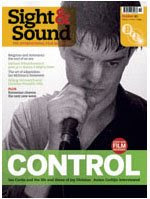 Author/screenwriter Nathanael West(1903-1940) died young, but he left two celebrated novels behind, Miss Lonelyhearts (1933) and The Day of the Locust (1939). The latter is one of the finest
Author/screenwriter Nathanael West(1903-1940) died young, but he left two celebrated novels behind, Miss Lonelyhearts (1933) and The Day of the Locust (1939). The latter is one of the finest
roman á clefs ever written about
Hollywood, on par with Budd
Schulberg's What Makes Sammy
Run? and Joan Didion's Play It As It Lays. (Or
the uber-cynical cinematic equivalents: Billy
Wilder's Sunset Blvd and Robert Altman's The
Player.) It also features a character named—
yes, that's right—Homer Simpson.
Locust Music is an independent label located in Chicago. Last year, founder Dawson Prater released one of my favorite records, Starless and Bible Black's self-titled debut. This year, he has continued to issue material that defies easy categorization, like Silmaril's The Voyage of Icarus and Begushkin's Nightly Things. An element of folk runs through these recordings, but that doesn't make Locust a folk label, not when some artists use samplers and other electronic devices. As Kelefah Sanneh (The New York Times) quips, it "specializes in music too weird to be considered old-fashioned." Well, weird's a bit much, but unique—definitely.  230 Divisadero
230 Divisadero "Hands"
"Hands" (mp3)
from "230 Divisadero"
(Locust Music) More On This Album230 Divisadero, 230 Divisadero, Locust Music
More On This Album230 Divisadero, 230 Divisadero, Locust Music
Whispery words meet fuzzy, buzzy instrumentation
on the debut from this two-man duo. Matt Shaw hails
from Britain and Nick Grey from Monaco. Their long-
distance working relationship recalls the Tall Dwarfs
and the Postal Service, but their music stands alone.
The two are joined by guests on guitar, clarinet, and
bass. They also credit Hasmig Bedrossian for soprano
voice ("Old Photograph") and Constance Lozet for random
humming ("For Cody"). For the most part, though, they
created these lovely, multi-layered sounds on their own.
The Family Elan, Stare of Dawn, Locust Music
Considering that Glasgow's Chris Hladowski cites Greek, Kurdish, and Azerbaijani devotional music as influences, it may seem simplistic, if not misleading, to compare
the Family Elan to the Incredible String Band, a British collective formed in the 1960s.

However, the ISB's Mike Heron and Robin Williamson also looked to the East for inspiration, specifically to India and Pakistan (hence the tabla and sitar). Hladowski's instruments of choice include the bouzouki and long-necked lute, while partner Hanna Tuulikki joins in on voice and flute.
Stare of Dawn is a contemporary affair, but it could easily be the product of another era. Or plane of existence. Similarly, it's easy to lose track of time when listening to these five long pieces. Time doesn't stop, it just...expands. (
Time is flowing like a river/ to the sea...)
My knowledge of devotional music is limited, but I get the
same feeling listening to
the Family Elan as to Sufi vocalist
(and former UW artist-in-residence) Nusrat Fateh Ali Khan,
even if the emphasis is on the chiming, droning playing rather than the soft-spoken singing (Khan was a full-throated vocalist).
 The Family Elan
The Family Elan "Wide Eyed Fox"
"Wide Eyed Fox" (mp3)
from "Stare of Dawn"
(Locust Music) More On This Album
More On This AlbumDo Hladowski and Tuulikki also enter a trance-like state
when they perform? Does their audience also dance like
whirling dervishes? It wouldn't surprise me if they did.
Henry Flynt & Nova'billy, Henry Flynt and Nova'billy, Locust Music Is Flynt an avant-gardist or just a trippy freak?
-- François Couture, the All Music GuideTalk about uncategorizable.
Nova'billy, which stalked
the Earth—specifically Lower Manhattan—from 1974-
1975, mates southern-fried rock with free-jazz skronk.

According to Eugene Chadbourne's illuminating
AMG biography, Flynt
was an associate of Yoko Ono, the
Velvet Underground (he sat in for
John Cale), and La Monte Young. On Locust's fourth Flynt release (see below
for more), the North Carolina native is credited with vocals, violin, and guitar.
With a maximum of jamming—
Flynt's violin playing is particularlyvirtuosic—and a minimum of (left-wing) vocalizing, you
could recommend this live album to fans of Little Feat
andOrnette Coleman, the Allman Brothers Band
and Pharaoh Saunders. And how many artists can you say
that about?
Note: Other Flynt releases on Locust include Raga Electric - Experimental Music: 1963-1971, I Don't Wanna, and Purified by the
Fire. Image credit: Henry Flynt at Nova'billy concert, The Kitchen, June 27, 1975, photo by Peter Moore © the Estate of Peter Moore.
Paul Metzger, Deliverance, Locust Music
Paul Metzger's fifth solo effort,
Deliverance, which seems unlikely to have been influenced by the classic 1972 John Boorman movie—or the James Dickey book that inspired it—consists of three pieces. All played on the 21-string banjo. In
no way, shape, or form does it resemble the film's famous "Dueling Banjos." Not that that would be a terrible thing. It just doesn't.

To my ears, the Minnesota musician's customized banjo sounds like a violin crossed with a sitar, and brings to mind the string-work of local guitar maestro (and sometime-Locust recording artist) Sir Richard Bishop. On an LP, the first two tunes ("Orans" and "Bright Red Stone")
probably fit on one side, while the 31:07-minute title track
most likely takes up the entirety of the other (
Deliveranceis also available on 180-gram vinyl in a gatefold sleeve).
In
Arthur, Byron Coley and Thurston Moore describe the disc
as a "brilliant long-form acoustic exploration of the cosmos' outer tears, free from cliché and dullness." Yep, that about sums it up.
Ethan Rose, Spinning Pieces, Locust Music
The sophomore release from Oregon's
Ethan Roseis also comprised of three tracks. The insert explains
the thinking behind its structure, i.e. "These pieces were
originally issued as limited edition multiples by Locust Music."
The first track, "The Singing Tower" (2007), was "sourced
from the automated carillon at Stanford University." The
second, "...The Dot and the Line..." (2004), was "sourced
from player pianos at the Immortal Piano Company" (located
in his Portland hometown). And the last, "Miniature & Sea"
(2003), was "sourced from music boxes and optical film reader."
Despite the divergent dates, sound sources, and locations,
the three pieces work together surprisingly well. Music
writers often (and understandably) use the word "nostalgic"
to describe Rose's delicate, handcrafted work—it's the aural
analogue of a film by Britain's fabulous Brothers Quay.
Endnote: For more information, please visit Locust Music. Images: Nathanael West from Find a Grave (he and his wife are buried in Maspeth, NY), the Family Elan from their MySpace Page,
Henry Flynt from Henry Flynt Philosophy (including Tony Conrad's photographs of Flynt and director Jack Smith picketing MOMA!), and Paul Metzger from Webzine Millefeulle.
 Into the Prine
Into the Prine







